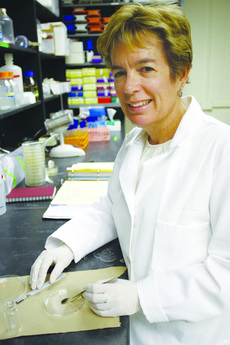A kissing bug has brought a Loyola professor international attention. Patricia Dorn, biology professor; Dawn Wesson, of Tulane University Health Sciences Center and Leon Perniciaro, biology senior, have identified a human case of Chagas disease. The discovery was the first case in Louisiana of the insect-transmitted Chagas parasite in a human.
It is the first case recorded in the state and only the sixth case ever recorded in the United States. The Louisiana identification was made by Dorn and her colleagues after Wesson called about the possible case last summer.
Dorn said she was contacted because of her considerable work on Chagas and 16 years of work with the parasite. Dorn has also worked on the genetics of the kissing bug and helped develop blood tests for the parasite.
Dorn said the discovery has received attention from colleagues and news services all over the world. “I received e-mails from colleagues in Spain and Argentina.”
The story was picked up by media in Germany, Romania and by India News, as well as many U.S. news outlets, including The (Baton Rouge) Advocate, Dorn said.
Chagas disease causes heart disease. The infection occurs when a kissing bug bites a person to obtain its blood meal. The bug defecates while eating and then leaves.
The parasite is introduced to the body when a person scratches the bite and usually pushes the feces into the wound. Other possible ways of introduction include through the eyes, nose or mouth.
Eleven to 14 million people are infected with Chagas and about 50,000 die every year from its complications. Cases of Chagas are more common in Central, Latin and South America. This is because of the open-air houses they live in and the close proximity to the forest habitats of the kissing bugs.
Cases in the United States are rare not only because of the lack of habitat for the insects but also the type of kissing bug most prevalent in the U.S. is “not as bad-mannered,” according to Dorn, and deposits the parasite-containing feces 30 minutes after a blood meal, making it less effective at transmission.
Out of all people infected, only 20 to 30 percent will develop heart disease. Early symptoms of the illness are mild and rarely diagnosed. People can go ten to 20 years without realizing they have the parasitic infection, Dorn said.
Once Chagas develops it is progressive and typically fatal. Dorn said it is often called a silent killer.
While there are no vaccines, Dorn said she is involved in a vaccine trial with a professor from Mexico. The only treatment for Chagas is Nifurtimox, a medication only available from the Centers for Disease Control. It is only effective in the early and hard to detect stages of the disease and has numerous troublesome side effects, Dorn said.
Once Chagas reaches the chronic stage it is not treatable, Dorn said. It is a real concern, Dorn said, but people should not be alarmed because it is very rare.
Despite its rarity, it is still a public health issue, according to Dorn. There is, however, an increasing risk of acquiring the disease through blood transfusion and organ transplant in the U.S.
There have been five documented cases of infection from blood transfusion and five transmissions through organ transplant, Dorn said. Two transmissions were from heart transplants that took place in Los Angeles last year, Dorn said.
“It’s become more critical to screen the blood,” Dorn said, because of the influx of immigrants from highly endemic areas. It is estimated that more than 100,000 immigrants entering the U.S. have the disease and are not aware. Because of this high risk of transmission, the Food and Drug Administration is requiring mandatory blood screening for Chagas.
Dorn, Perniciaro and Ashley Tate, biology senior, are researching several other aspects of Chagas.
The other research focuses mostly on control and interruption of transmission, Dorn said. Additional projects specifically involve working with LSU Veterinary School to study Chagas in dogs and looking at cycles of infection in animals in Louisiana, working with a colleague in Guatemala on the genetics of the kissing bug there, looking at what strains are circulating in Louisiana, identify forms and hosts of the parasite and working with a student from Brazil on identifying what the kissing bugs are feeding on during the blood meal.
Tara Templeton can be reached at [email protected].

The kissing bug, found to be a carrier of the Chagas parasite, is at the center of biology professor Patricia Dorn’s research. (Tom Macom)







